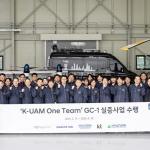NEWS
In a town hall meeting this morning, SK Telecom (SKT)’s CEO, Ryu Young-sang told employees that AI will be integral to the company’s growth, targeting a market capitalisation of roughly $28.46 billion by 2026
In the telecoms industry’s never-ending quest for improved efficiency and new revenue streams, AI capabilities and integration are quickly emerging as major catalysts for telco transformation.
For SKT, however, it appears that AI is becoming more than just a useful tool in the telco’s arsenal, but rather the mainstay of their business strategy.
This morning, celebrating the one-year anniversary of having taken up the mantle of CEO, SKT’s Ryu Young-sang told employees of his desire to turn the company into a world-leader in AI, going far beyond the scope of a traditional telco.
“We will leap into SKT’s version of a distinguished AI company that combines AI with connective technologies based on our main business of telecommunications,” said Ryu.
Ryu said that the company would seek out new investment and M&A opportunities in the AI space, aiming build on their existing AI capabilities to launch new products and services to consumers and enterprises. In the short term, this includes the launch of an AI-incorporated media player to manage SKT’s various TV and IP-based media assets, as well as enhancing the company’s mobile virtual assistant, A., which was launched earlier this year.
According to Ryu, this new focus would help the company achieve a market capitalisation of roughly $28.46 billion by 2026, almost four times that of its existing market cap of around $8.1 billion.
It should be noted, however, that AI is not the only area in which SKT is doubling its efforts, as the company continues to evolve beyond the bounds of a traditional telco.
Eschewing the partnership-based strategy adopted by most telcos when it comes to consumer content, SKT has instead been pushing for more direct control over its content offerings. In recent months, the company has increased investments in content creation, investing directly into numerous production studios, as well as further developing its metaverse platform, Ifland, even signing a deal with Deutsche Telekom to offer it in Germany.
In fact, just a few weeks ago, SKT announced a new agreement with e& (formerly Etisalat), aiming for SKT to develop metaverse service that directly fits the need of e&’s Middle Eastern customers.
As traditional telco revenues continue to dry up around the world, SKT – and, indeed, the company’s South Korean rivals, LG U+ and KT – are heavily investing in new revue streams, especially products that can be exported to international markets.
Also in the news:
Remaining competitive in an evolving telco landscape
Wi-Fly: Could AFC improve rural connectivity?
BT warns of further job losses as soaring bills force bigger cost-cutting drive
















